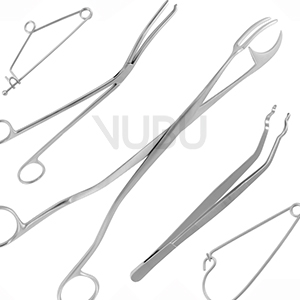Sterilization instruments such as forceps and clamps are specifically designed to safely grasp and secure sterile items without the need for hand contact, thereby preventing contamination. These instruments are indispensable tools in medical facilities, laboratories, and operating rooms, ensuring the highest standards of hygiene and sterility.
Thanks to their precise construction, they enable the safe handling of sterilized materials, such as instruments, towels, bowls, or suture materials. They play a crucial role in minimizing the risk of infections and contaminations, thereby enhancing patient safety.
Features and Benefits of Sterilization Instruments:
Precision: Ergonomically designed handles and finely crafted tips allow for secure gripping and accurate positioning of sterile items.
Hygiene: Their design prevents direct hand contact, reducing the risk of cross-contamination.
Durability: Made from stainless steel or other high-quality materials, they are long-lasting, easy to clean, and autoclavable.
Versatility: Available in various sizes and designs to meet different requirements in medicine, surgery, and laboratory technology.
Areas of Application:
Operating Rooms: For the safe handling of sterilized instruments and materials during surgical procedures.
Sterilization Departments: For the hygienic retrieval and distribution of sterile items.
Laboratories: For handling sterile samples and equipment.
Dentistry: For the precise placement of sterile instruments and materials.
Why Are Sterilization Instruments Indispensable?
In medical facilities, adhering to hygiene standards is of utmost importance. Sterilization instruments such as forceps and clamps play a central role in ensuring these standards. They enable medical staff to handle sterilized materials safely, efficiently, and without contamination – a critical factor for the success of surgeries, diagnoses, and treatments.
Tips for Care and Handling:
Thoroughly clean the instruments after each use and sterilize them according to the applicable hygiene guidelines.
Store the instruments in a dry and protected place to ensure their longevity.
Regularly check the functionality and condition of the instruments to ensure they are always ready for use.
Conclusion:
Sterilization instruments such as forceps and clamps are indispensable tools in modern medicine. They not only help maintain hygiene standards but also enhance the efficiency and safety of medical processes. Invest in high-quality sterilization instruments to improve the quality of your work and ensure patient safety.
